- Home
- Phyllis Ann Karr
The Idylls of the Queen Page 14
The Idylls of the Queen Read online
Page 14
“You are losing your chance, Seneschal. The King will not thank you for this.”
“I don’t appreciate being played for a fool and goaded into attacking you like another one of your bloody puppets, Mordred. If you want to be murdered on command, you’re going to have to tell me why, convince me you’re not a madman. Otherwise, you can just lie down, drown, and damn yourself, for all I care.”
I turned and began wading to shore. After a few moments I heard him splash up and follow me. Gillimer and Lovel unarmed us and dried us off in silence.
“If you were counting on Dame Nimue to hear the noise and come up to stop us,” I remarked, “it seems you would have been out of luck. Maybe she’s not at home.”
“I assume,” he replied, “that a knight seeking the company of the Lady of the Lake should hail her with no less care and courtesy than one seeking admittance to a lesser stronghold.”
The squires built a fire on the beach, which they could have done while we were fighting. Nor had they seen properly to the horses; they had been gawking instead at what they could see and hear of the battle. “Then go take care of them now,” I said. “We can’t count on being welcomed into Dame Nimue’s city and stabling them there for the night.” Four palfreys and two chargers would keep Gillimer and Lovel out of earshot for some time.
Mordred and I began searching each other’s wounds by firelight. “All right,” I said, “are you going to tell me now, or will I have to enlist Dame Nimue to get it out of you with her arts?”
“You rely a great deal on your influence over the Dame of the Lake. Do you truly expect her to do your beck and call?”
“I expect her to stand by the King and court,” I answered. “She always has before.”
“Then let us hope she’s at home and heard your call.” Mordred shrugged, rather lopsidedly because of his wounds. “Very well, then, I’ll assume you do not already know the tale, and tell it, to make you regret the opportunity you gave up a few moments ago.”
CHAPTER 17
Sir Mordred’s Tale of the Priest in the Woods
“For she was a passing fair lady, therefore the king cast great love unto her, and desired to lie by her; so they were agreed… So there she rested for a month, and at the last departed.… But all this time King Arthur knew not that King Lot’s wife was his sister.”
—Malory I, 19
“Have you ever wondered, Seneschal,” Mordred began, “why my name is so different from those of my brothers? Gawain, Agravain, Gaheris, Gareth… the ‘g’ runs like a badge through the names of the sons of Lot. Only my name is different—the first half of it inherited from my mother. ‘Mor’—the Latin sound for death. None of my brothers shares that sound, not even Agravain.”
“None of them got part of his name from your father, either,” I said. “Gawain was named for his hermit godfather. I suppose your parents simply found they liked the ‘g’ sound.”
“It occurs in our mother’s name, also. Morgawse. My brothers inherited the sound of life from her, I the sound of death.”
“You think I tried to poison you because you don’t have a ‘g’ in your name?”
“I am more fully our mother’s son than any of my brothers. They had two parents—King Lot and Queen Morgawse. Even though they left their father to join their mother in Arthur’s party, they still avenged Lot’s death. I had only one true parent—Dame Morgawse.”
“If you’re stalling in hopes I won’t make you get to the point when Lovel and Gillimer come back, Mordred, you’re—”
He waved me down. “Do you remember when I first came to Arthur’s court? I was bright and eager then, was I not? Filled with pure ideals and noble aspirations—too noble, perhaps.”
“At least you came more honestly than your sneaking brother Beaumains with his kitchen-boy act.”
Mordred nodded. “Truth, honor, and valor. King Arthur had tried to destroy me in babyhood, but I understood and forgave. It was not me, myself, he had tried to destroy, but a prophecy. Let the parents of the other May Babies hold it against him, let the small drowned souls haunt him if they pleased—I had survived by God’s good grace, I had no personal memory of the incident, but I could understand our King’s fear of Fate, and I forgave. My brothers were serving their uncle with all their hearts, and my mother comforted me when I mourned that all Arthur’s greatest wars were behind him, all his deadliest enemies slain or won to his side without my help. ‘There will always be the Saxons from over the sea,’ she said, ‘and the Romans, ever restive. There is the sly King Mark of Cornwall, and war must come someday with Claudas of France. There is still service to do for your uncle, and still honor to win.’
“If I had not understood Arthur’s fear of Fate before, I would have understood it from the carved stone in Camelot cathedral. The serpent of my uncle’s old nightmare terrified me, as if the nightmare had been my own. I never knelt in Camelot cathedral without praying to God that I might help my uncle the King crush that old nightmare, and I knelt often those first two years of my knighthood.”
“Sometimes I thought you were going to turn into another Bors de Ganis,” I remarked.
“I thought, of course,” he went on, “that the nightmare had probably been averted, that the serpent had been drowned along with all the other May Babies. But there was the chance that the two warnings—Merlin’s prophecy of the child born in May, and Arthur’s dream of the serpent coming forth from his own side—foretold two separate dangers. The May child was safely put away, but the serpent might be the King’s bastard Sir Lohot, or Mark of Cornwall, Claudas of France, or even Arthur’s viceregent in distant Rome.” Mordred smiled, the firelight making a gargoyle mask out of his handsome face. “I was very young and very innocent then, aside from being in love with two or three fair dames and damsels at once. A trait I inherited, no doubt, from my royal father.”
Or from his royal mother, but I did not mention that aloud.
“You remember that I rode for a time with Lancelot, during my second year as knight,” he continued. “The great Lancelot, brother Gawain’s dearest friend and Gareth’s ideal. He praised me more than once for knightly work well done. I earned praise from Lancelot, the right-hand man of my King and uncle, and I was in ecstasy, poor fool.
“We learned of a coming tournament in Peningues. The night before the tourney we stopped with an old vavasour near the castle. In the early dawn we rode into the forest to hear Mass at a woodland chapel our host knew of on our way. The dawn was clear, the birds trilling their Morningsong, God was in His Heaven, and there was glory to be won in a few hours in the lists at Peningues.”
Mordred had been twisting a branch of driftwood in his hands, harder and harder. It broke, and he threw the pieces on the fire. “Between our host’s manor and the chapel, we found an old priest telling his beads at somebody’s marble tomb. We would have passed by in silence, not wishing to interrupt his devotions, but my palfrey nickered.
“The old man glanced up. He squinted for a moment at Lancelot and myself. Then he hailed us as ‘the two most unfortunate knights who ever lived.’
“’This does not promise well for the day’s tourney,’ said Lancelot, who had never lost a battle in his life.
“’You do not even know us, good father,’ I said. ‘How do you know our fate?’
“He pointed first at me. ‘You are Mordred, son of Morgawse of Orkney and Arthur the King.’
“I thought at first it was some ugly jest—an enemy had pointed me out to the old man in secret and taught him what to say. I tried to hold my anger, like a good, meek Christian. ‘I am the last son of Lot the king, old man. Your wits are wandering.’
“’You are the son of Arthur the King, your uncle. You are the fruit of incest, heinous in the sight of God and man. You are the serpent who has come forth from the side of the King, to destroy him and eat up all his good works. All your fathers have done good in their lifetimes, but you will do more evil than all your ancestors have done good!’”
After a moment he looked up again, smiling crookedly. “Forgive my outburst, Seneschal. An old wound. I jumped down from my horse and began throttling the old man, trying to choke from him a confession that he was lying. I felt Lancelot’s hands on me, pulling me away from the priest, but he was too late. In trying to choke his words back down his throat, I had broken his neck.
“’God!’ said Lancelot. ‘You’ve killed him, and he had a prophecy for me!’
“’Thank God you did not hear yours,’ I said. I thought he would go into one of his battle rages and kill me, but instead he rode on with our host. I stayed for some time at the marble tomb with the priest’s body. I think I prayed to be forgiven, but already I understood that his prophecy had been true.
“At last I rode after Lancelot and our host, found them in the forest chapel, and perjured myself by eating the Body of Our Lord. I think I hoped that if I were killed in the tournament that day, and the prophecy canceled out, it would be a sign I was forgiven and might yet hope for salvation. I told Lancelot, ‘No doubt his prophecy for you was that you would kill me.’
“’That would make me a fortunate knight, not an unfortunate one,’ he said, and rode away from my side. I tried to be killed in that day’s tourney—Ihesu, how I tried! For a while I thought I had succeeded.” He shrugged. “But they pulled me out and nursed me back to life and wholeness of limb, and so it seems the prophecy is indeed true, and I must fulfill it.”
“Your brother Gawain would have laughed it off like a sensible man,” I said. “And he’s as faithful to God and Mary as the best of us.”
“Gawain! Always Gawain! I am not my brother, Seneschal. Gawain has a very convenient creed—he adores the sweet comforts of holy faith and ignores the threats. He believes in Heaven, but not in Hell.”
“That’s why he still wears the hair of that poor dame he killed by accident, and the green sash to remind him of the time he was found a little less than perfect. Your brother, Mordred, has a grain of sense about prophecies. Of course they’ll come true—if a man broods on them until he finds his chance to make them come true.”
“And that baron—what was his name?—who tried to discredit Merlin’s prophecies? You remember him? How he went to the mage three different times and brought back three different prophecies of how he was to die—hanging, drowning, and falling from his horse. Did he watch his opportunity to fall from his horse on a bridge and hang upside-down with the reins around his neck and his head beneath the water, merely to prove Merlin right?”
“Accident,” I said. “It worked out nicely for the old prophecy-monger, but the baron was a clumsy fool. Chances were very good he’d die in some kind of accident, and if any one of Merlin’s three prophecies had come true, it would have been remembered and the other two forgotten. Doing evil is not an accident.”
“It was accident that I broke the old priest’s neck. It was accident that Gawain killed Sir Ablamar’s lady.” Mordred shook his head. “When the priest died without retracting his words, and when I missed death in the Peningues tourney, I knew I was fated to fulfill the prophecy somehow, as surely as Judas was fated to betray Our Lord.”
“After traveling with Lancelot’s example in front of you, it’s hardly surprising you went into a rage and killed the old busybody. What is surprising is that Lancelot didn’t go into a rage and kill you.”
“Exactly. I suppose at the crucial moment he spared me for Gawain’s sake, or Gareth’s, or the old vavasour our host’s. But it is ever the same tale. At the crucial moment, every man refrains from killing me, or else fails, and leaves me alive to my Fate. Even you, Sir Kay. Even though I am an unnatural birth—a monster.”
“Mordred,” I said, “neither of them knew they were brother and sister. Merlin relied on the Sword in the Stone to prove Arthur’s claim, and never revealed Arthur’s parentage until months later. He had never even told my father whose son Arthur was.”
“And perhaps even you did not realize he had gotten into her bed? That was her condition, that it be done with secrecy. I know. I asked my mother. She was alive, then. I still would not fully believe the priest’s words, you see, until I had heard from her own lips the possibility that I was Arthur’s son instead of Lot’s. Oh, they were innocent in their incest—but not in their adultery. What could she do? She remembered what Uther Pendragon had done to her mother Dame Igraine—though she did not known that Arthur was the fruit of that sin—and she did not want her husband to die as Igraine’s first husband, my maternal grandfather, had died. Satisfying Arthur’s lusts in secret seemed the best way to help fashion peace between him and Lot.”
“She couldn’t have been particularly displeased with Arthur,” I observed. “She stayed loyal to him afterwards.”
“Yes. She might have been his queen, after Lot’s death, if they had not turned out to be brother and sister, and if it had not been for Guenevere. But my mother’s attempt to make peace might have worked, might have saved King Lot, if it had not been for Merlin’s prophecy and Arthur’s murder of the May Babies.” Again Mordred smiled. “I caused Lot’s death. Supposing me to be his own son, Lot went to war a second time against Arthur for my murder. Even if you had succeeded in poisoning me five days ago, Seneschal, I might have somehow fulfilled the prophecy and become the serpent of my uncle-father’s dream, even in my very death.”
“For the last time, Mordred, I did not try to poison you.”
“Perhaps you did not know the tale, after all. You heard me out patiently enough. But it’s not unlikely that Lancelot confided it to the Queen, and hardly impossible that either he or she confided it to the King. For years I have been waiting for the stroke to fall, wondering whether they would find their chance to murder me, as Arthur’s other bastard was murdered for less reason, before I found my chance to play the serpent. Can you blame me for assuming that it had finally come, or for thinking of you as their tool?”
“If you decide you’re going to live up to some foul prophecy,” I said, “that’s your choice. You can cheat it just as well by refusing to take this chance you think is coming to you someday as by trying to get yourself killed in the meantime. But if you’re going to ride with me and try to find out what really happened at the Queen’s dinner, you’re going to stop doubting that Her Grace is innocent.”
He smiled and adjusted the bandage on my right arm. “I will, at least, keep my doubts locked in my own brain. As you do, Sir Seneschal. Meanwhile, shall we try to summon up Dame Nimue and gain her hospitality, or shall we sit here until dawn, bleeding into her white sand?”
I stood. “You might at least have accused me back at court.”
“To what purpose? Mador would not believe my notions above his unless I were to explain the full reason for my thoughts. Shall we return to court and tell them all my secret?”
“No.”
Mordred was right. At most, his accusation, without full details, would result in a double trial, him against me and Mador still hot against the Queen. And if Mordred did tell his story to the court, it would seem all the more evidence against Her Grace.
I had finally had my chance to fight for my own good name, beside the Lake with our two squires as witnesses; and it had not done Dame Guenevere a bloody bit of good.
CHAPTER 18
The Lady of the Lake
“Right so as they sat there came running in a white hart into the hall, and a white brachet next him, and a thirty couple of black running hounds came after with a great cry, and the hart went about the Table Round as he went by other boards. The white brachet bit him by the buttock and pulled out a piece, wherethrough the hart leapt a great leap and overthrew a knight that sat at the board side; and therewith the knight arose and took up the brachet, and so went forth out of the hall, and took his horse and rode his way with the brachet. Right so anon came in a lady on a white palfrey, an
d cried aloud to King Arthur, Sir, suffer me not to have this despite, for the brachet was mine that the knight led away. I may not do therewith, said the King.
“With this there came a knight riding all armed on a great horse, and took the lady away with him with force, and ever she cried and made great dole. When she was gone the King was glad, for she made such a noise.”
—Malory III, 5
I went to the water’s edge. Except for the ripples that caught our firelight, the Lake was almost invisible under the now-blackened sky.
Having given some thought to the matter, I had decided the simplest summons would be best. I cupped my hands and called Dame Nimue’s name several times. The water remained black and untroubled, the ripples continuing to lap unconcerned at my toes.
“Sir,” called Lovel from somewhere off to my right, where they had hobbled the horses, “there’s a boat here on the beach.”
“But no hand waving a sword in the middle of the Lake,” I shouted back. Groping around, I found a couple of good-sized pebbles. I drew back my arm to throw the first one.
“Do not throw it, Sir Kay,” said a voice behind me. “Would you put out the eye of one of my hounds or horses?”
I turned and saw Dame Nimue on the grass beyond the sand. She was dressed in white with a little gold embroidery on her sash and the hem of her skirt, and she let her hair flow loose and golden to her waist as if she were still a maid and not a married woman. In fact, she seemed not to have aged a year since the time she first took up with Merlin. But she cast no magical glow, although that was the effect she gave at first. She walked across the sand to me, seeming to glide rather than step. Mordred rose and stood respectfully as she passed the fire, and I glimpsed Gillimer and Lovel hanging back at a safe distance to watch.
I made my reverence and said, “How did you get there without us seeing you, Dame? Invisibility?”

 The Gallows in the Greenwood
The Gallows in the Greenwood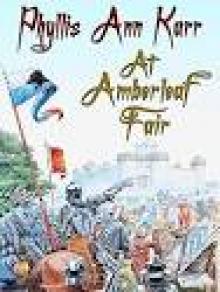 At Amberleaf Fair
At Amberleaf Fair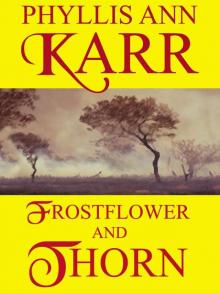 Frostflower and Thorn
Frostflower and Thorn The Fanciers & Realizers MEGAPACK
The Fanciers & Realizers MEGAPACK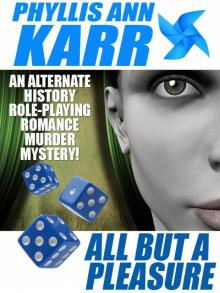 All But a Pleasure
All But a Pleasure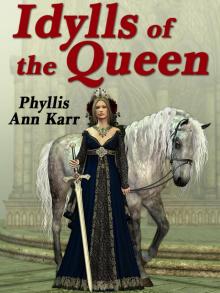 The Idylls of the Queen
The Idylls of the Queen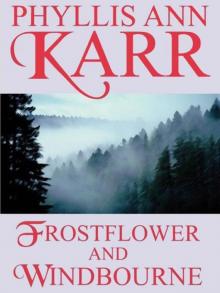 Frostflower and Windbourne (Frostflower & Thorn)
Frostflower and Windbourne (Frostflower & Thorn)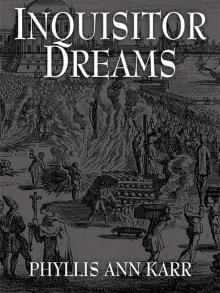 Inquisitor Dreams
Inquisitor Dreams